
The Continuation War, also known as the Second Soviet-Finnish War, was a conflict fought by Finland and Nazi Germany against the Soviet Union (USSR) from 1941 to 1944, as part of World War II. In Soviet historiography, the war was called the Finnish Front of the Great Patriotic War. Germany regarded its operations in the region as part of its overall war efforts on the Eastern Front and provided Finland with critical materiel support and military assistance, including economic aid.

Finland, officially the Republic of Finland, is a Nordic country in Northern Europe. It borders Sweden to the northwest, Norway to the north, and Russia to the east, with the Gulf of Bothnia to the west and the Gulf of Finland to the south, across from Estonia. Finland covers an area of 338,455 square kilometres (130,678 sq mi) with a population of 5.6 million. Helsinki is the capital and largest city. The vast majority of the population are ethnic Finns. Finnish and Swedish are the official languages, Swedish being the native language of 5.2% of the population. Finland's climate varies from humid continental in the south to boreal in the north. The land cover is primarily a boreal forest biome, with more than 180,000 recorded lakes.
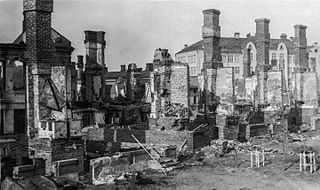
The Finnish Civil War was a civil war in Finland in 1918 fought for the leadership and control of the country between White Finland and the Finnish Socialist Workers' Republic during the country's transition from a grand duchy of the Russian Empire to an independent state. The clashes took place in the context of the national, political, and social turmoil caused by World War I in Europe. The war was fought between the Red Guards, led by a section of the Social Democratic Party, and the White Guards, conducted by the senate and those who opposed socialism with assistance late in the war by the German Imperial Army at the request of the Finnish civil government. The paramilitary Red Guards, which were composed of industrial and agrarian workers, controlled the cities and industrial centers of southern Finland. The paramilitary White Guards, which consisted of land owners and those in the middle and upper classes, controlled rural central and northern Finland, and were led by General C. G. E. Mannerheim.

Helsinki is the capital, primate, and most populous city of Finland. Located on the shore of the Gulf of Finland, it is the seat of the region of Uusimaa in southern Finland and has a population of 665,558. The city's urban area has a population of 1,268,296, making it by far the most populous urban area in Finland as well as the country's most important center for politics, education, finance, culture, and research. Helsinki is located 80 kilometres (50 mi) north of Tallinn, Estonia, 400 km (250 mi) east of Stockholm, Sweden, and 300 km (190 mi) west of Saint Petersburg, Russia. It has close historical ties with these three cities.

The history of Finland begins around 9,000 BC during the end of the last glacial period. Stone Age cultures were Kunda, Comb Ceramic, Corded Ware, Kiukainen, and Pöljä cultures. The Finnish Bronze Age started in approximately 1,500 BC and the Iron Age started in 500 BC and lasted until 1,300 AD. Finnish Iron Age cultures can be separated into Finnish proper, Tavastian and Karelian cultures. The earliest written sources mentioning Finland start to appear from the 12th century onwards when the Catholic Church started to gain a foothold in Southwest Finland.

Scandinavia is a subregion in Northern Europe, with strong historical, cultural, and linguistic ties between its constituent peoples. Scandinavia most commonly refers to Denmark, Norway, and Sweden. In English usage, it can sometimes also refer more narrowly to the Scandinavian Peninsula, or more broadly to all of the Nordic countries, also including Finland, Iceland, and the Faroe Islands.

The Winter War was a war between the Soviet Union and Finland. The war began with a Soviet invasion of Finland on 30 November 1939, three months after the outbreak of World War II, and ended three and a half months later with the Moscow Peace Treaty on 13 March 1940. Despite superior military strength, especially in tanks and aircraft, the Soviet Union suffered severe losses and initially made little headway. The League of Nations deemed the attack illegal and expelled the Soviet Union.
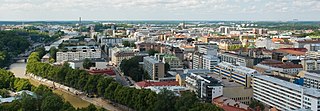
Turku is a city and former capital on the southwest coast of Finland at the mouth of the Aura River, in the region of Finland Proper (Varsinais-Suomi) and the former Turku and Pori Province. The region was originally called Suomi (Finland), which later became the name for the whole country. As of 31 March 2021, the population of Turku was 194,244 making it the sixth largest city in Finland after Helsinki, Espoo, Tampere, Vantaa and Oulu. There were 281,108 inhabitants living in the Turku Central Locality, ranking it as the third largest urban area in Finland after the Capital Region area and Tampere Central Locality. The city is officially bilingual as 5.2 percent of its population identify Swedish as a mother tongue.
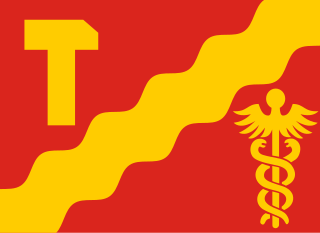
Tampere is a city in the Pirkanmaa region, located in the western part of Finland. Tampere is the most populous inland city in the Nordic countries. It has a population of 244,029; the urban area has a population of 341,696; and the metropolitan area, also known as the Tampere sub-region, has a population of 393,941 in an area of 4,970 km2 (1,920 sq mi). Tampere is the second-largest urban area and third most-populous individual municipality in Finland, after the cities of Helsinki and Espoo, and the most populous Finnish city outside the Greater Helsinki area. Today, Tampere is one of the major urban, economic, and cultural hubs in the whole inland region.

The Grand Duchy of Finland, also translated as Grand Principality of Finland, was the predecessor state of modern Finland. It existed between 1809 and 1917 as an autonomous part of the former Russian Empire.

Finns or Finnish people are a Baltic Finnic ethnic group native to Finland.

The Finland national football team represents Finland in men's international football competitions and is controlled by the Football Association of Finland, the governing body for football in Finland, which was founded in 1907. The team has been a member of FIFA since 1908 and a UEFA member since 1957.

Finland participated in the Second World War initially in a defensive war against the Soviet Union, followed by another battle against the Soviet Union acting in concert with Nazi Germany and then finally fighting alongside the Allies against Germany.
The Official Finnish Charts are national record charts in Finland compiled and published by Musiikkituottajat – IFPI Finland. The name Suomen virallinen lista/Finlands officiella lista, which is singular in both Finnish and Swedish, is used generically to refer to both the albums and the singles chart, and the context reveals which chart is meant.

Finnish is a Uralic language of the Finnic branch, spoken by the majority of the population in Finland and by ethnic Finns outside of Finland. Finnish is one of the two official languages of Finland. In Sweden, both Finnish and Meänkieli are official minority languages. The Kven language, which like Meänkieli is mutually intelligible with Finnish, is spoken in the Norwegian county Troms og Finnmark by a minority group of Finnish descent.

During World War II, the Lapland War saw fighting between Finland and Nazi Germany – effectively from September to November 1944 – in Finland's northernmost region, Lapland. Though the Finns and the Germans had been fighting together against the Soviet Union since 1941 during the Continuation War (1941–1944), peace negotiations between the Finnish government and the Allies of World War II had been conducted intermittently during 1943–1944, but no agreement had been reached. The Moscow Armistice, signed on 19 September 1944, demanded that Finland break diplomatic ties with Germany and expel or disarm any German soldiers remaining in Finland.
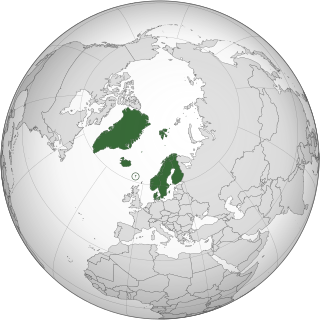
The Nordic countries are a geographical and cultural region in Northern Europe and the North Atlantic. It includes the sovereign states of Denmark, Finland, Iceland, Norway and Sweden; the autonomous territories of the Faroe Islands and Greenland; and the autonomous region of Åland.
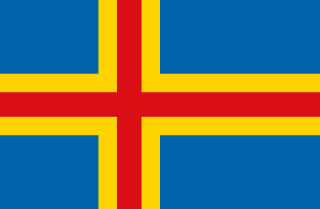
Åland has been an autonomous and demilitarised region of Finland since a 1920 decision of the League of Nations. It is the smallest region of Finland by both area (1,580 km2) and population (30,129), constituting 0.51% of Finland's land area and 0.54% of its population. Its only official language is Swedish and the capital city is Mariehamn.

Sanna Mirella Marin is a Finnish politician who has served as the leader of the Social Democratic Party of Finland (SDP) since 2020. A member of Parliament since 2015, she previously served as prime minister of Finland from 2019 to 2023.



















